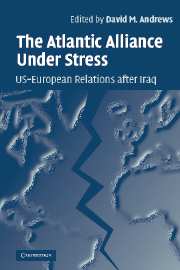Book contents
- Frontmatter
- Contents
- List of contributors
- Preface
- Introduction
- I The Iraq War and the Atlantic alliance
- II National policies within the Alliance
- 4 US politics and transatlantic relations: we are all Europeans now
- 5 Three rifts, two reconciliations: Franco-American relations during the Fifth Republic
- 6 Security exporters: Germany, the United States, and transatlantic cooperation
- 7 A bridge too far: the United Kingdom and the transatlantic relationship
- 8 The richest and farthest master is always best: US–Italian relations in historical perspective
- III Prospects for the Alliance
- References
- Index
8 - The richest and farthest master is always best: US–Italian relations in historical perspective
Published online by Cambridge University Press: 22 September 2009
- Frontmatter
- Contents
- List of contributors
- Preface
- Introduction
- I The Iraq War and the Atlantic alliance
- II National policies within the Alliance
- 4 US politics and transatlantic relations: we are all Europeans now
- 5 Three rifts, two reconciliations: Franco-American relations during the Fifth Republic
- 6 Security exporters: Germany, the United States, and transatlantic cooperation
- 7 A bridge too far: the United Kingdom and the transatlantic relationship
- 8 The richest and farthest master is always best: US–Italian relations in historical perspective
- III Prospects for the Alliance
- References
- Index
Summary
“If we have to make do with a mock Europe … or … with some Anglo-French pastiche, then it would be better not to play the game and to support the Atlantic Community instead … Italy not being able to be independent by herself, and Europe being unable to proceed with a real integration, then ‘the richest and farthest master is always best.’” In February 1963, when the process of European integration seemed to be on the verge of collapse as a consequence of the initiatives of President Charles de Gaulle of France, Ambassador Roberto Ducci summed up in this brilliant if cynical definition the role of the United States as the lodestar of Italian foreign policy. Aligning with the United States inside the Atlantic alliance was singled out by Ducci as the best possible option for Italy if the process of European integration were derailed and European relations were to revert to the traditional pattern of national power politics. That game, Ducci implicitly warned, was one that Italy had already tried and lost, and should not be tempted to play again; instead, siding with the strongest power provided the best chance for a return to the foreground of the European political landscape.
Ducci's words capture in a nutshell the importance that the United States has assumed in the history of Italy's international relations since World War II.
- Type
- Chapter
- Information
- The Atlantic Alliance Under StressUS-European Relations after Iraq, pp. 177 - 198Publisher: Cambridge University PressPrint publication year: 2005
- 5
- Cited by

